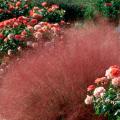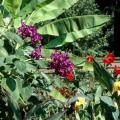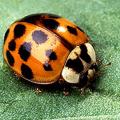News From 2004
MISSISSIPPI STATE -- Mississippi's sweet potato crop will finish like it started: at the mercy of the weather.
Bill Burdine, area agronomist in Chickasaw County with Mississippi State University's Extension Service, said above-average rainfall in late May and early June divided the 2004 sweet potatoes into two distinct crops.
MISSISSIPPI STATE -- Some are spooky, some are funny, some are just strange, and they're all waiting to greet visitors to the Scarecrow Trail at the Northeast Mississippi Research and Extension Center in Verona.
The Scarecrow Trail opened to the public Sept. 25 and will remain open through Oct. 25. The trail winds though gardens filled with flowers and landscape plants.
By Norman Winter
MSU Horticulturist
Central Mississippi Research & Extension Center
If you want to see next year's hot new zinnias, be sure to attend the Fall Flower and Garden Fest Oct. 15-16 at the Truck Crops Experiment Station in Crystal Springs.
Among the new zinnias is the Magellan series, which is sure to be hot. The Magellan Coral will be an All-America Selections winner next year. As you look at the colors available, you'll think they are all winners.
MISSISSIPPI STATE -- Trees often are left in cattle pastures for shade and beauty, but research has shown that they can be planted there as a second crop without hindering the first.
Cattle, hay and lumber can be produced on the same ground at the same time. Known as silvopasture, it is the practice of growing widely spaced pine trees on land that is being farmed for cattle and hay production.
By Tricia Hopper
MISSISSIPPI STATE -- Trees provide shade and beauty and are considered an asset to most campuses, communities and homes, but they can become a liability as they age.
Mississippi State University is home to hundreds of trees of numerous species used to beautify areas and provide shade and shelter. Whenever a significant storm comes through, trees may be damaged or lost. In the concentrated area of campus, falling trees and limbs pose a significant danger to cars, buildings and people.
MISSISSIPPI STATE -- When Mississippi State University President Charles Lee bought his wife Pat a puppy for Christmas, the family grew in much the same way as if a child had been born.
Little Grands Yeux -- that's French for Big Eyes -- celebrated her first birthday Sept. 20, and Mrs. Lee said the standard schnauzer is a beloved part of the Lee family.
"I absolutely do consider her a member of our family and, frankly, I give her everything I would give a child," Lee said. "She's a bit spoiled, actually."
MISSISSIPPI STATE -- Mississippi's shrimping industry dodged the worst of Hurricane Ivan, but other parts of the Gulf of Mexico were not as fortunate.
Hurricane Ivan in September made an indirect hit on the Mississippi Gulf Coast while hitting Alabama and Florida. Three others hit Florida this season.
Dave Burrage, Extension fisheries specialist at Mississippi State University's Coastal Research and Extension Center in Biloxi, said Mississippi fishermen weren't affected by Ivan nearly as much as those farther east.
MISSISSIPPI STATE -- Record high oil prices are focusing a lot of attention on alternative energy sources, including biodiesel, a fuel derived from vegetable oils.
Since soybean oil is the most commonly used vegetable oil in biodiesel, it would seem soybean producers would be among its biggest fans. Farm use of biodiesel, however, is not widespread, and that concerns Thomas Howarth, who grows soybeans on his Circle H Farm near Cleveland.
"I would like to see more farmers aware of biodiesel," he said. "I'm lucky to live in an area where it's available."
By Norman Winter
MSU Horticulturist
Central Mississippi Research & Extension Center
Muhly grass is already showing out with its incredible display of color. No doubt, it will be the hit again at the Annual Fall Flower and Garden Fest Oct.15-16.
This event, held at the Truck Crops Branch Experiment Station in Crystal Springs, is unsurpassed as the best free horticultural festival in the South.
MISSISSIPPI STATE -- Mississippi's Extension Service employees still travel dirt roads, but they are also on super highways; their communication efforts have made similar progress.
New video conferencing lines are enabling the Mississippi State University Extension Service to save costs in travel and time as well as expand their reach into communities throughout the state, nation and world.
MISSISSIPPI STATE -- A team of Mississippi State University veterinary researchers hopes to find the genetic defect responsible for a devastating skin disease in American quarter horses.
MISSISSIPPI STATE -- The wind and rain brought by Hurricane Ivan did not hurt the state's peanut crop, and producers in South Mississippi are expecting a 2-ton per acre harvest to match last year's yield.
Mike Howell, area agent for agronomic crops with the Mississippi State University Extension Service, said harvest is just starting. Howell covers a 21-county area from headquarters in Covington County, and said the year appears to have been a good one for peanuts.
MISSISSIPPI STATE -- An upcoming workshop will help Mississippi entrepreneurs learn how to use the Internet to market their products and services.
"Electronic Retailing: Selling on the Internet" will be offered Oct. 28 in Greenwood, Nov. 2 in Starkville and Nov. 4 in Brandon. Sponsored by Mississippi State University's Extension Service, each workshop is designed for new and existing businesses wanting to sell products and services through a retail Web site.
By Norman Winter
MSU Horticulturist
Central Mississippi Research & Extension Center
Taking care of the landscape after a hurricane or tornado can seem like an overwhelming task, especially if a lot of trees are down. Unfortunately, what took a few hours to bring down may take weeks to clean up.
First and foremost, take care of any damaged trees that could fall or break. Hire trained professionals to deal with these damaged trees to avoid, or at least minimize, further damage.
By Norman Winter
MSU Horticulturist
Central Mississippi Research & Extension Center
The prettiest plant at my house right now is called Princess Flower. With a name like Princess Flower, or Glorybush, you can probably guess this plant has some outstanding attributes. You're right: mine has hundreds of royal-purple flowers opened, and it looks beautiful towering above my Indian Summer rudbeckias.
MISSISSIPPI STATE -- Grill masters everywhere have their own tricks for bringing the juiciest, most tender steak to the table, but much of its final success is determined long before that steak hits the hot coals.
Terry Kiser, head of Animal and Dairy Science at Mississippi State University, said genetics play a major role in the tenderness and juiciness of beef.
"The genetic component is highly heritable," Kiser said. "If we can ever get a handle around the genetics, we can effect some permanent change in tenderness in the beef population."
MISSISSIPPI STATE -- Research on a disease in chickens that closely resembles Hodgkin's lymphoma in humans could provide better diagnosis and treatment for people who suffer with this cancer.
Dr. Shane Burgess, an assistant professor in Mississippi State University's College of Veterinary Medicine, said one of the significant findings of his research on Marek's disease virus of chickens is that Marek's disease is the first natural model for Hodgkin's lymphoma in humans.
MISSISSIPPI STATE -- Mississippi plant nurseries mostly succeeded in minimizing damage from Hurricane Ivan, but their biggest challenges still may be ahead of them.
Fred Croom has been running Croom's Nursery in George County for four years. As Hurricane Ivan approached, he removed the shade cloth and plastic from his greenhouses and waited out the storm. After Ivan passed, Croom's 19 greenhouses, 10,000 mums, 4,000 ferns and 20,000 pansies were mostly fine, but his market in Mobile was gone.
MISSISSIPPI STATE -- One of the friendly bugs is about to become rather unfriendly.
As fall approaches, the ladybug, known scientifically as the Asian lady beetle, will be looking for a warm place to spend the winter. In their native land, this overwintering home is a rocky outcropping, but in Mississippi, they make do with light-colored buildings.
Blake Layton, entomologist with the Mississippi State University Extension Service, said buildings with unshaded western or southern exposures are the most attractive to the beetles.
By Norman Winter
MSU Horticulturist
Central Mississippi Research & Extension Center
When the quantity of flower plantings gets out of hand, even good folks can become slaves to the garden.
To be perfectly honest, I had a home where I felt like I had created the botanical garden from you-know-where. Sure, it was pretty and everyone "oohed" and "ahhed," but after a while it started to feel like I should be getting paid for the upkeep. Sadly, my garden stopped being fun and became work.
Pages
News Types
- Crop Report (424)
- Feature Story (5882)
- Feature Photo (53)
- Extension Outdoors (318)
- Southern Gardening (1466)
- Extension Inbox (95)
Archive
- 2025 (54)
- 2024 (186)
- 2023 (182)
- 2022 (183)
- 2021 (176)
- 2020 (211)
- 2019 (222)
- 2018 (276)
- 2017 (336)
- 2016 (381)
- 2015 (456)
- 2014 (495)
- 2013 (487)
- 2012 (491)
- 2011 (354)
- 2010 (320)
- 2009 (313)
- 2008 (272)
- 2007 (263)
- 2006 (252)
- 2005 (278)
- 2004 (270)
- 2003 (279)
- 2002 (227)
- 2001 (238)
- 2000 (241)
- 1999 (231)
- 1998 (231)
- 1997 (239)
- 1996 (58)
- 1995 (36)






